Jehu In The Bible Meaning: Anointed for Judgment
Jehu, depicted in 2 Kings 9-10, is emblematic of divine retribution and religious zeal. Anointed by the prophet Elisha, his mission was to eradicate the idolatrous practices of Ahab’s house and Baal worship.
Jehu’s reign is marked by the violent purges of Ahab’s lineage and Baal’s followers, fulfilling prophetic judgments and aiming to restore Yahweh’s dominance in Israel. However, his legacy is complex; though zealous, he upheld certain idolatrous practices, reflecting a selective obedience to divine commandments.
Jehu represents both the fervor for religious purity and the challenges of incomplete reform. Further exploration reveals more nuances of his impactful yet controversial reign.

Jehu in the Bible: Meaning, Kingship, and Zeal for God’s Justice
| Aspect | Details |
|---|---|
| Name | Jehu (Hebrew: יֵהוּא) |
| Meaning | “Yahweh is He” or “The Lord is God” |
| Biblical References | 1 Kings 19:16, 2 Kings 9–10 |
| Role | King of Israel; anointed by prophet Elisha |
| Key Actions | Overthrew Ahab’s dynasty; eradicated Baal worship |
| Character Traits | Zealous, bold, politically strategic |
| Spiritual Symbolism | Divine judgment, obedience to God’s call, flawed human leadership |
Jehu’s Anointing as King
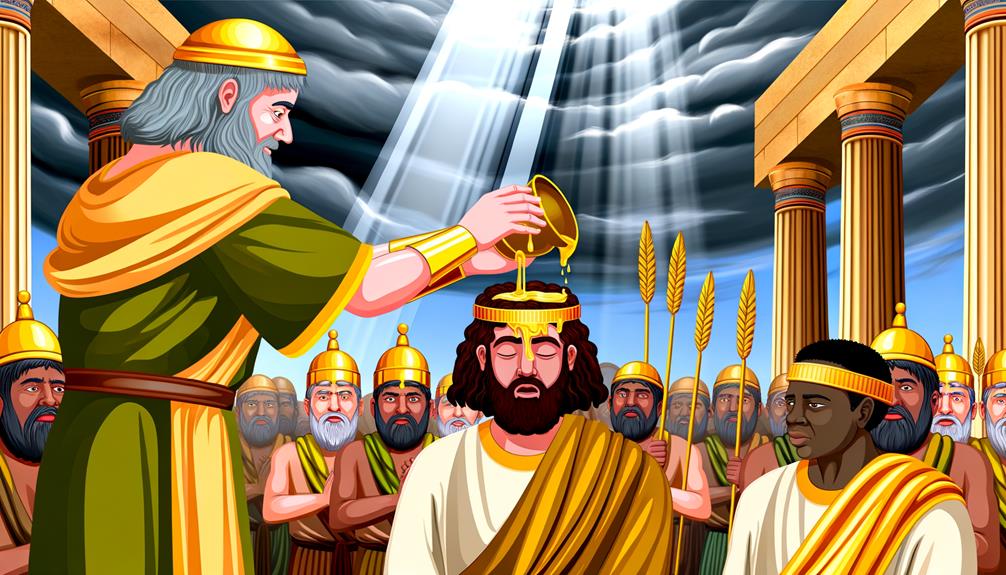
Jehu’s anointing as king marks a pivotal moment in the biblical narrative, characterized by a divinely orchestrated shift in Israel’s leadership.
The event is documented in 2 Kings 9:1-13, where the prophet Elisha, acting on God’s command, instructs a young prophet to anoint Jehu, a military commander, as the new king of Israel.
This act signifies a divine intervention aimed at addressing the prevailing corruption and idolatry within the kingdom.
Jehu’s anointing is not merely a political maneuver but a theological statement, reinforcing the belief in divine sovereignty over human affairs.
The ceremony itself, conducted in secrecy and urgency, underscores the dramatic and transformative nature of Jehu’s rise to power, setting the stage for significant forthcoming events.
The Downfall of Ahab’s House
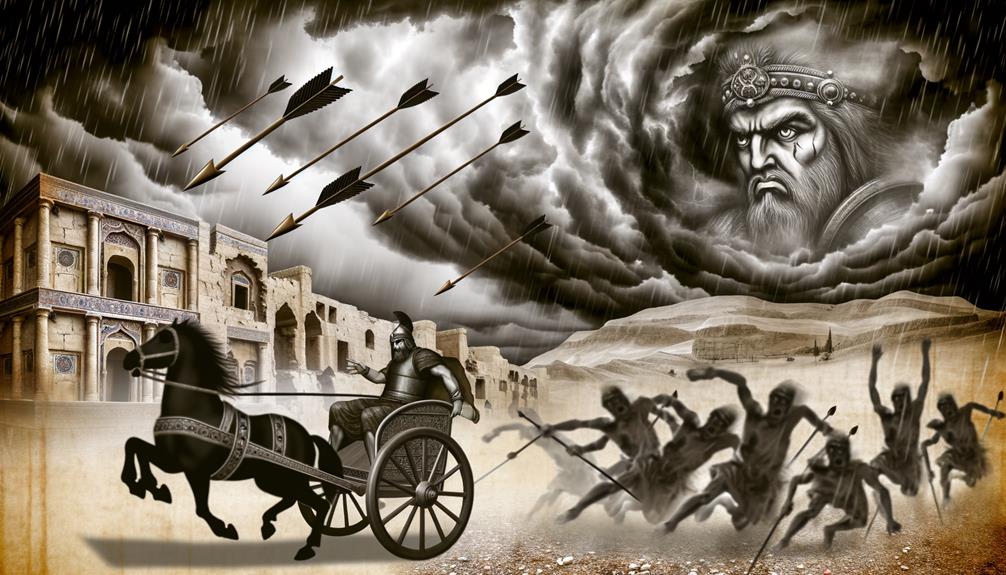
The downfall of Ahab’s house represents a decisive and brutal fulfillment of prophetic judgement against a dynasty steeped in idolatry and injustice.
Under Jehu’s leadership, the extermination of Ahab’s lineage marked a pivotal turning point in Israel’s history. This purge included the deaths of King Joram, Queen Jezebel, and seventy of Ahab’s descendants, effectively erasing the family’s influence.
The biblical narrative underscores the divine retribution for Ahab’s sins, particularly his promotion of Baal worship and Naboth’s unjust execution.
The events unfolded in a manner that underscored the severity of divine justice, as foretold by the prophet Elijah. Jehu’s actions, while violent, were seen as necessary to purify Israel and reaffirm the supremacy of Yahweh over the nation.
Jehu’s Zeal for the Lord
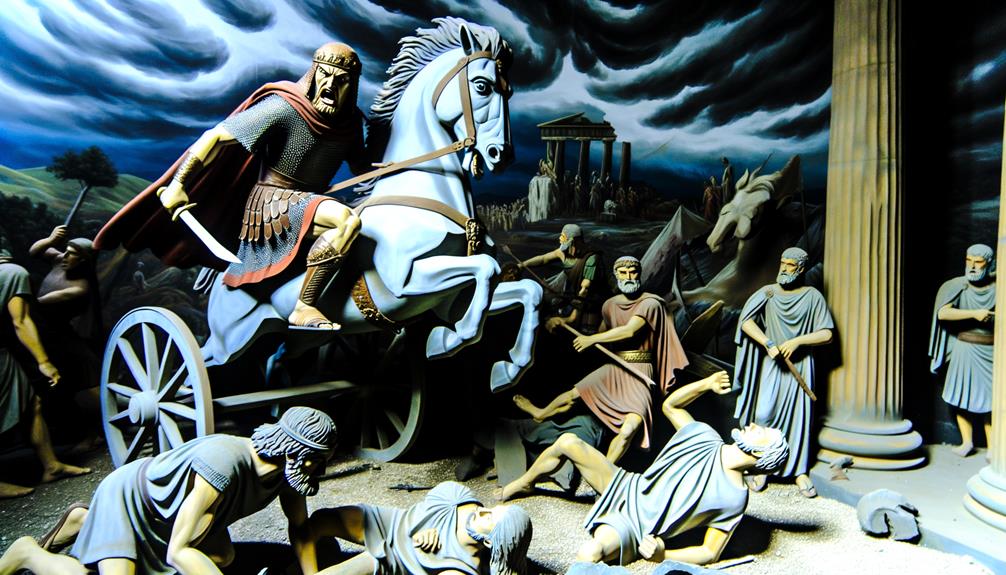
Jehu’s zeal for the Lord is prominently displayed through his aggressive actions against Baal worshipers, which served to eliminate idolatry in Israel.
His anointing by the prophet Elisha and consequent actions fulfilled God’s prophecy, demonstrating a commitment to divine directives.
This fervor underscores a pivotal moment in biblical history where religious reformation and prophetic fulfillment converge.
Destroying Baal Worshipers
In his mission to eradicate Baal worship from Israel, Jehu demonstrated an unwavering commitment to religious reform and a zealous dedication to the Lord. His actions were marked by strategic and decisive steps to dismantle the entrenched idolatry.
Jehu’s campaign included:
- Deception of Baal Worshipers: Jehu cunningly lured the worshipers of Baal into a trap by inviting them to a grand assembly, ostensibly to honor Baal.
- Mass Execution: Once gathered, he ordered the mass execution of all Baal worshipers, ensuring no survivors.
- Destruction of the Temple: He then directed the demolition of Baal’s temple, eliminating the physical structure of idolatry.
- Eradication of Baal Artifacts: Finally, he ordered the destruction of Baal’s sacred pillars and idols, purging the remnants of the cult.
Anointing and Prophecy Fulfilled
Anointing Jehu as king of Israel marked a pivotal moment in biblical history, fulfilling the prophecy delivered by the prophet Elisha. This anointment was a strategic act to bring about divine judgment upon the house of Ahab, aligning with God’s mandate.
Jehu’s subsequent actions demonstrated his fervent dedication to eradicating idolatry and restoring Yahweh’s worship. His zealous campaign included the extermination of Baal worshipers, thereby fulfilling his divinely ordained mission.
This act of purging the nation from idolatry underscored Jehu’s commitment to the covenantal laws of Israel. By executing these directives, Jehu not only solidified his legitimacy as king but also reinforced the prophetic vision, showcasing the profound intersection of divine will and human agency in biblical narratives.
The Eradication of Baal Worship
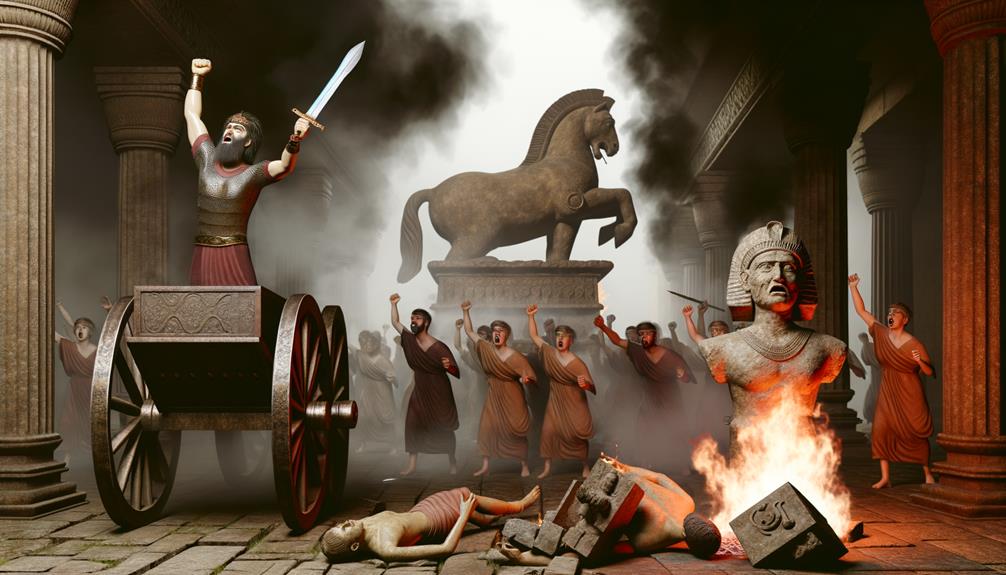
Systematically dismantling the worship of Baal, Jehu employed strategic measures to eradicate this idolatrous practice from Israel. His approach was methodical and decisive, reflecting his commitment to purging the kingdom of religious corruption.
Jehu’s actions were marked by several key initiatives:
- Deception and Execution: Jehu deceitfully gathered Baal worshippers under the pretense of a grand sacrificial ceremony, only to execute them en masse (2 Kings 10:18-28).
- Destruction of Temples: He ordered the demolition of Baal’s temple and transformed it into a latrine, symbolizing utter desecration.
- Eliminating Priests: The priests of Baal were systematically killed, ensuring no leadership remained to revive the cult.
- Legislative Reforms: Jehu implemented laws to prevent the resurgence of Baal worship, reinforcing monotheistic practices.
These measures reflect a calculated effort to restore Israel’s devotion to Yahweh.
Jehu’s Reign and Policies
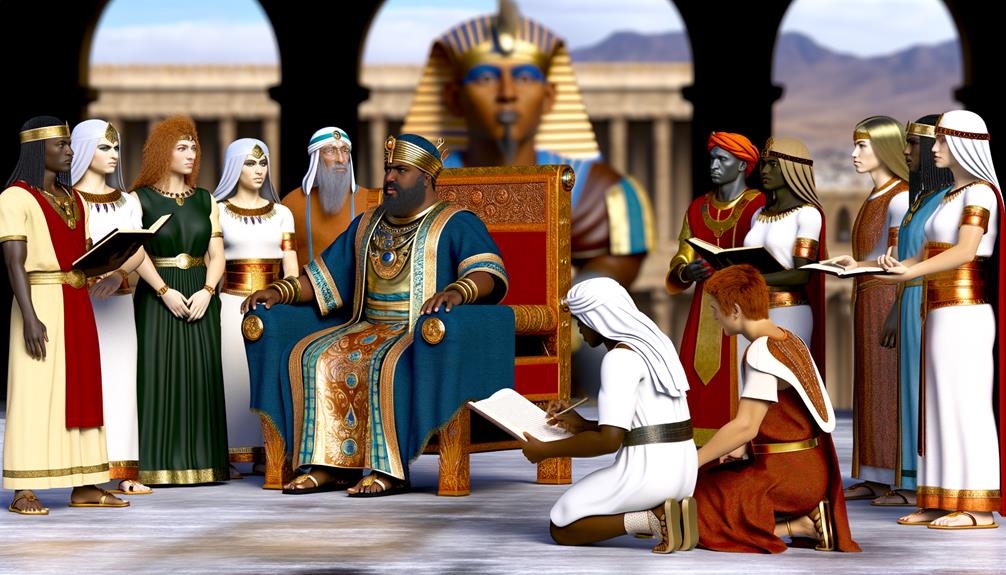
Jehu’s reign was characterized by a series of decisive military campaigns and strategic conquests that consolidated his power.
Concurrently, he implemented significant religious reforms aimed at eliminating Baal worship and restoring the worship of Yahweh.
Additionally, Jehu navigated complex political landscapes to form alliances that would fortify his rule and stabilize the nation.
Military Campaigns and Conquests
During his reign, Jehu launched a series of military campaigns that considerably altered the political and religious landscape of the Northern Kingdom of Israel. His aggressive strategies and decisive actions led to significant territorial and political changes.
Jehu’s conquests were marked by:
- Overthrow of Jehoram: Jehu assassinated King Jehoram, effectively seizing control of the throne and ending the Omri dynasty.
- Elimination of Jezebel: He ordered the execution of Queen Jezebel, a powerful figure promoting Baal worship.
- Massacre at Jezreel: Jehu orchestrated the killing of Ahab’s seventy sons, consolidating his power and eliminating potential rivals.
- Suppression of Baal Worshipers: He eradicated the priests of Baal, reflecting his commitment to monotheistic worship.
These actions solidified his authority and reshaped Israel’s socio-political fabric.
Religious Reforms Enacted
Through a series of religious reforms, Jehu sought to eliminate idolatry and reestablish the worship of Yahweh in the Northern Kingdom of Israel. His most notable action was the eradication of Baal worship, which had been introduced by previous dynasties.
Jehu orchestrated the destruction of Baal’s temple and executed its priests, thereby dismantling the institutional framework of this foreign cult. Additionally, he targeted the remnants of Ahab’s family, who were strong proponents of Baal worship.
Despite these drastic measures, Jehu’s reforms were not exhaustive; he left the worship of the golden calves at Bethel and Dan untouched. This selective approach indicates a complex interplay between religious zeal and political pragmatism during his reign.
Political Alliances Formed
One of the strategic maneuvers in Jehu’s reign was the formation of political alliances that aimed to consolidate his power and stabilize his rule over the Northern Kingdom of Israel. Jehu’s alliances reflected both pragmatic and opportunistic approaches to governance.
Analyzing his policies reveals several key alliances:
- Alliance with the prophetic community: Jehu leveraged support from prophets like Elisha to legitimize his rule.
- Diplomatic relations with surrounding nations: He established treaties to secure borders and trade routes.
- Internal coalitions with influential Israelite factions: Gaining the backing of military leaders and tribal chieftains was essential.
- Exploiting Assyrian power dynamics: By aligning with the Assyrians, Jehu sought to counterbalance threats from rival states.
These alliances underscore his strategic acumen in maneuvering complex political landscapes.
Biblical Perspectives on Jehu
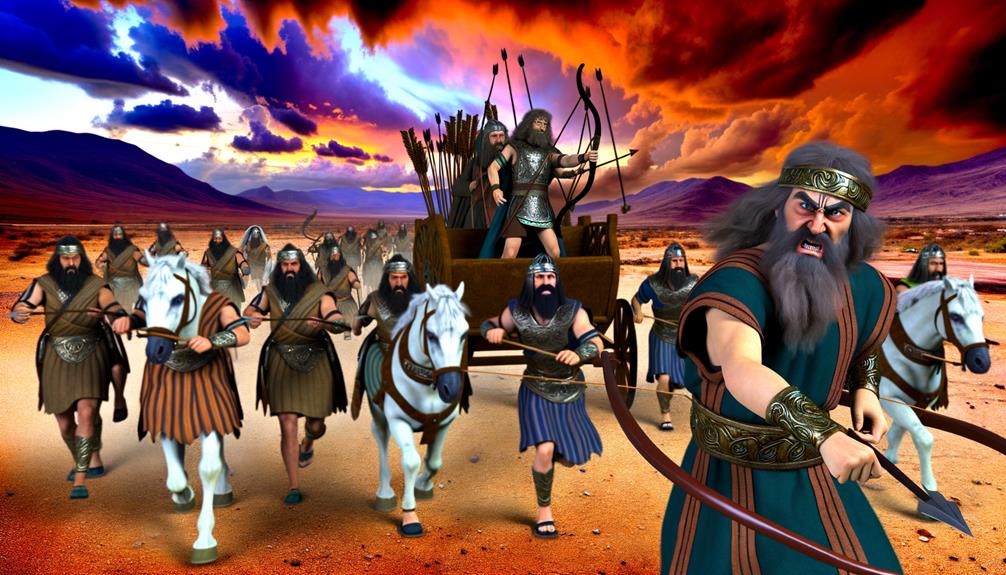
Jehu’s role in biblical history is often interpreted through the lens of his zealous actions to eradicate the worship of Baal in Israel. His definitive move to eliminate the house of Ahab and destroy Baal worship, as recounted in 2 Kings 9-10, reflects his commitment to reestablishing monotheistic worship.
Jehu’s violent means, including the massacre of Baal’s prophets and followers, portray him as a divine instrument of judgment. However, his later actions, such as continuing the practices of Jeroboam, complicate his legacy.
Biblical narratives offer a multifaceted view, celebrating his initial zeal while critiquing his failure to fully adhere to the covenantal laws. Consequently, Jehu emerges as a complex figure, embodying both reformative zeal and subsequent shortcomings.
Jehu’s Legacy in Scripture
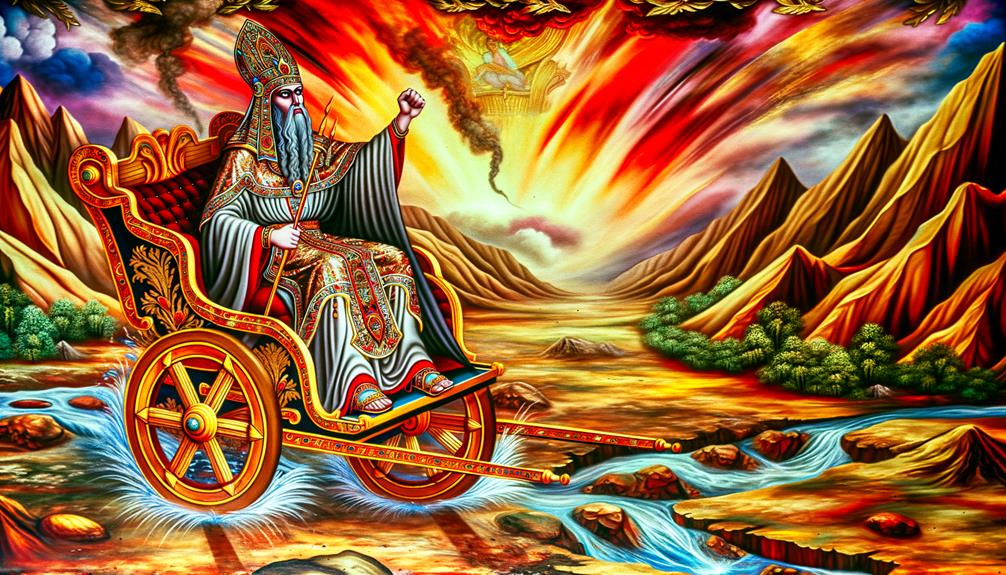
While Jehu’s initial zeal positioned him as a pivotal reformer in Israel’s religious landscape, his legacy in Scripture is marked by a nuanced assessment of his long-term impact and adherence to divine commandments.
Analyzing his reign reveals several critical points:
- Failed Religious Reforms: Despite his efforts, Jehu did not remove the golden calves at Bethel and Dan, perpetuating idolatry.
- Bloodshed and Violence: His violent methods, though initially divinely sanctioned, left a legacy of brutality.
- Partial Obedience: Jehu followed God’s instructions selectively, compromising Israel’s spiritual purity.
- Temporary Stability: His actions brought short-term political stability but failed to secure enduring faithfulness to Yahweh.
These points underscore the complexity of Jehu’s legacy, highlighting both his reforms and his shortcomings.
Conclusion
Jehu’s reign, marked by his anointing and subsequent fervor in dismantling Ahab’s lineage and Baal worship, illustrates a fervent yet paradoxical devotion to divine directives.
His zealous actions, while ostensibly righteous, invite scrutiny over their brutal execution.
The biblical narrative, replete with irony, juxtaposes Jehu’s piety against his ruthless methods, consequently casting a shadow over his legacy.
Ultimately, Jehu stands as a complex figure, emblematic of the often contradictory nature of divine mission and human ambition.






